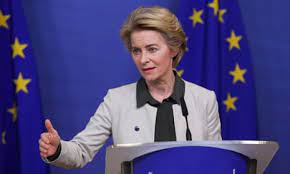EU must overhaul decision-making before enlargement -Franco-German document

Brussels: The European Union must radically overhaul its decision-making and funding before it can accept more countries to join the 27-nation bloc by 2030, a paper commissioned from experts by the French and German governments said, polarising EU countries.
Eight countries currently have official EU candidate status – Turkey, Ukraine, Moldova, Albania, Bosnia and Herzegovina, Montenegro, North Macedonia and Serbia – while two, Georgia and Kosovo, are potential candidate countries.
“For geopolitical reasons, EU enlargement is high on the political agenda, but the EU is not ready yet to welcome new members, neither institutionally nor policy wise,” said the report, presented to EU ministers in Brussels on Tuesday.
The document, seen by some officials as an opening bid in a long debate over the coming years on how to reform the EU, got mixed initial reviews from EU government ministers.
“It was able to concentrate the debate on a few points and at the same time polarise the answers of Member States,” Pascual Ignacio Navarro Rios, Spain’s acting Europe minister told a news conference.
The document, which states it should not be seen as representing the views of Paris and Berlin yet was presented by the two countries, says the EU should move to taking all of its decisions by a qualified majority, rather than reserving some areas for unanimous agreement.
“The institutions and decision-making mechanisms were not designed for a group of up to 37 countries and … they make it difficult even for the 27 to manage crises effectively and take strategic decisions,” it said.
The EU requires unanimous decisions on foreign and security policy, taxes, EU finances, some areas of justice and home affairs and social security and protection.
The unanimity requirement has been criticised by some governments and experts as either substantially slowing or even blocking the EU’s development, as all decisions in these areas have to be reduced to the lowest common denominator.
Yet changing this would require amendments to EU treaties, which would be a long and difficult process and would itself require unanimity.
The paper also calls for a strengthening of the condition that a government must observe the rule of law and EU values to get EU money, as the bloc has been struggling for years with nationalist and authoritarian governments in Poland and Hungary.
The document urges the EU to change its treaties to allow the issuance of common EU debt and shorten its budget cycle to five years – the term of the European Commission and Parliament – from the current seven years.
It says the EU budget, now around 1% of the EU’s gross national income a year, should be increased to handle the rising number of tasks the EU is handling as a bloc, and that new revenue sources should be permanently allotted to it.
Finally, the paper says that some countries in the EU should be allowed to form closer cooperation than others, forming four tiers of European integration.
The deepest integration would be in the inner circle similar to the euro zone using the single currency and the passport-free Schengen travel zone.
The second tier would be the EU itself, a yet larger circle would be made up of Associate Members who would participate in the EU’s single market for goods and services and adhere to the EU’s common principles.
Finally there would be the European Political Community – a forum proposed by France that was launched last year – as an outer tier for political cooperation without having to be bound to EU law, it said.





